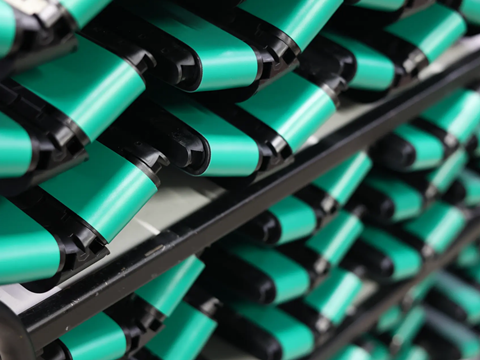
TOMRA has announced the creation of a scalable, open-access ecosystem to recycle and reuse materials from retired TOMRA technology, with the potential to manage the recycling of black plastic across a range of industries.
Established by TOMRA as part of its material circularity initiative, Retility, the value-chain collaboration was set up to recycle materials from retired TOMRA reverse vending machines, while also providing access to quality recycled content for use in the production of new TOMRA technologies.
TOMRA says the ecosystem contributes to its goals to ensure that by 2030, at least 90% of the materials and components in new TOMRA products are sustainable and at least 50% of TOMRA products are circular at their end of life, as well as helping other manufacturers pursue their own circularity targets.
The company states that carbon black polymers are notoriously difficult to recycle as they are not recognized by many available sorting technologies, whereby different polymer compounds could be separated from one another. It adds that this is a barrier to keeping each polymer type’s purity high enough to guarantee the desired physical properties are maintained in the new recycled compounds, resulting in carbon black polymers typically being sent for incineration.
TOMRA says that applications of black polymers are mostly found in computer and mobile technology, where reportedly up to 60% of the associated plastics are black, and the automotive industry, where around 90% of plastics are coloured black.
Working with European Recycling Platform in Norway, TOMRA says its Reverse Vending Machines (RVMs) are ‘responsibly decommissioned’ at their end of life. During disassembly, a range of black plastic parts are pre-sorted by polymer type before being passed to industrial plastics compounder Polykemi to be recycled in a quality-assured material stream.
Apparently, the ‘fully-documented’ recycled content is then sent to TOMRA’s existing injection moulding partners to become new polymer parts. This is said to enable TOMRA to achieve full circularity across a range of polymer components found in its products and provide an opportunity for other black-plastic based hardware producers to achieve the same.
Marius Fraurud, head of TOMRA Collection, said: “We encourage all relevant producers to join this ecosystem and join us in driving the Resource Revolution forward! We would be glad to offer our insight on this initiative and facilitate any necessary connections between stakeholders.”
In March, TOMRA Collection launched its Basic Line for stores new to participating in Deposit Return Systems (DRS), aiming to offer a simple way for retailers to begin collecting empty beverage containers for recycling while saving space and resources. The Basic Line is powered by TOMRA Essential Technology, which utilizes 360° barcode scanning, an integrated camera, and precise weight and metal sensors, to recognize various objects and brands, and ensure accurate refunds.
TOMRA Recycling recently partnered with Henkel to advance the sortability of packaging, with one of TOMRA’s detection systems installed at Henkel’s test laboratory in Düsseldorf. TOMRA’s AUTOSORT system can apparently detect product material type - such as plastics like PP, PET, HDPE or paper - and the colour of packaging, which can be decisive for sortability.
If you liked this story, you might also enjoy:
How are the top brands progressing on packaging sustainability?
Sustainable Innovation Report 2024: Current trends and future priorities
Reuse vs. single use – which is better for the environment?
The ultimate guide to global plastic sustainability regulation














No comments yet